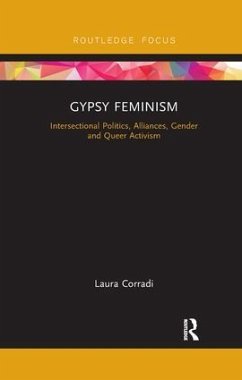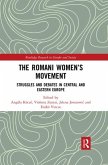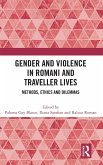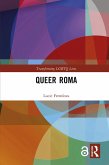Clumsy stereotypes of the Romani and Travellers communities abound, not only culturally in programmes such as Big Fat Gypsy Weddings, but also amongst educators, social workers, administrators and the medical profession. Gypsy cultures are invariably presented as ruled by tradition and machismo. Women are presented as helpless victims, especially when it comes to gendered forms of violence. The reality, however, is much more complicated.
In Gypsy Feminism, Laura Corradi demonstrates how Romaphobia - racist and anti-Gypsy rhetoric and prejudice, pervading every level of society - has led to a situation where Romani communities face multiple discrimination. In this context, the empowerment of women and girls becomes still more difficult: until recently, for example, women have largely remained silent about domestic violence in order to protect their communities, which are already under attack. Examining feminist research and action within Romani communities, Corradi demonstrates the importance of an intersectional approach in order to make visible the combination of racism and sexism that Gypsy women face every day.
This concise and authoritative book will appeal to scholars and students in the areas of Sociology, Cultural Studies, Women's and Gender Studies and Anthropology, as well as Politics, Media Studies, Social Policy, and Social Work. It is also an invaluable resource for activists, community and social service workers, and policymakers.
In Gypsy Feminism, Laura Corradi demonstrates how Romaphobia - racist and anti-Gypsy rhetoric and prejudice, pervading every level of society - has led to a situation where Romani communities face multiple discrimination. In this context, the empowerment of women and girls becomes still more difficult: until recently, for example, women have largely remained silent about domestic violence in order to protect their communities, which are already under attack. Examining feminist research and action within Romani communities, Corradi demonstrates the importance of an intersectional approach in order to make visible the combination of racism and sexism that Gypsy women face every day.
This concise and authoritative book will appeal to scholars and students in the areas of Sociology, Cultural Studies, Women's and Gender Studies and Anthropology, as well as Politics, Media Studies, Social Policy, and Social Work. It is also an invaluable resource for activists, community and social service workers, and policymakers.
Gypsy Feminism is a very necessary and timely book. Investigating and reclaiming Gypsy and Roma histories and worlding practices within a framework of feminist, queer and decolonial critique, the volume takes intersectional politics and intersectional analysis to new and highly important fields of study, breaking radically with epistemologies of ignorance. A 'must' for everyone committed to feminist futures.
-Nina Lykke, Professor Emerita, Unit of Gender Studies, Linköping University, Sweden
An interesting and useful book not only for Roma women (and for women in general) but for the whole Romanès community. Corradi offers a detailed feminist and intersectional account of the literature, and explores a little known theme: the reality of LGBTIQ people in the Roma community, often hidden. This is a quality study, and is essential reading.
-Fiore Manzo, poet and activist (Fondazione Romani Italia - Delegazione Calabria)
This wide-ranging and provocative book makes a compelling case for the unique and generative epistemological contributions of a Gypsy feminist politics to anti-racist, intersectional, and decolonial feminist thought. Drawing on the historical and transnational specificity of the material lives and embodied identities of Romani, Sinti, and traveller communities, Corradi confronts racist, anti-Gypsy (romaphobia) rhetoric head on, illuminating the radical potential of coalition and solidarity among Roma gender activists from multiple geopolitical locations outside the boundaries of nation-states. An original contribution to critical studies of race and coloniality in Europe.
-Chandra Talpade Mohanty, Author of Feminism Without Borders: Decolonizing Theory, Practicing Solidarity (2003), and Professor of Women's and Gender Studies, Syracuse University
A powerful analysis that fully explores the intersectionality of feminisim, queer activism, difference and diversity, decolonisation and social activism. Provocative and a must read for understanding the power of intersectional work. I recommend this book as one that will challenge current thinking while offering possibilities for thinking differently about difficult situations for women. I was taken by the breadth of analysis and scope of thinking presented by the author..a provocative read in many ways.
-Linda Tuhiwae Smith, professor of indigenous education at the University of Waikato in Hamilton, New Zealand, author of Decolonizing Methodologies: Research and Indigenous Peoples
Laura Corradi's book, Gypy Feminism: Intersectional Politics, Alliances, Gender and Queer Activism is a scholarly testimony on the emerging intersectional Romani feminism. She researched, followed and eye-witnessed, as a non-Romani scholar, the development of radical political and academic agenda of Romani feminism. Moreover, she not just describes but also offers a technique to de-colonialize feminist theory through critical reflection on race, power, and privilege. This book provides an essential theoretical foundation for anyone interested in the fragmented perspectives and subversive nature of Romani gender and queer activism. This is a unique book that has been produced with a specific will to decolonize knowledge production.
-Angéla Kóczé, Assistant Professor of Romani Studies, Central European University, author of Missing Intersectionality: Race/Ethnicity, Gender, and Class in Current Research and Policies on Romani Women in Europe
Breaking new grounds, this book, examines the complicated relationship of the Gypsies - one the most persecuted group of people in Europe - in relation to the state, racism, sexism and historical erasure. The scope of this book is important in creating new theoretical positions that challenge exclusionary practices.
-Margaret Abraham, Author of Speaking the Unspeakable: Marital Violence Among South Asian Immigrants in the United States and Professor, Hofstra University
This is an important book that takes to a world of struggle and resistance feminists so far have ignored and yet is highly inspiring.
-Silvia Federici, Professor Emerita and Teaching Fellow at Hofstra University, author of Caliban and the Witch
-Nina Lykke, Professor Emerita, Unit of Gender Studies, Linköping University, Sweden
An interesting and useful book not only for Roma women (and for women in general) but for the whole Romanès community. Corradi offers a detailed feminist and intersectional account of the literature, and explores a little known theme: the reality of LGBTIQ people in the Roma community, often hidden. This is a quality study, and is essential reading.
-Fiore Manzo, poet and activist (Fondazione Romani Italia - Delegazione Calabria)
This wide-ranging and provocative book makes a compelling case for the unique and generative epistemological contributions of a Gypsy feminist politics to anti-racist, intersectional, and decolonial feminist thought. Drawing on the historical and transnational specificity of the material lives and embodied identities of Romani, Sinti, and traveller communities, Corradi confronts racist, anti-Gypsy (romaphobia) rhetoric head on, illuminating the radical potential of coalition and solidarity among Roma gender activists from multiple geopolitical locations outside the boundaries of nation-states. An original contribution to critical studies of race and coloniality in Europe.
-Chandra Talpade Mohanty, Author of Feminism Without Borders: Decolonizing Theory, Practicing Solidarity (2003), and Professor of Women's and Gender Studies, Syracuse University
A powerful analysis that fully explores the intersectionality of feminisim, queer activism, difference and diversity, decolonisation and social activism. Provocative and a must read for understanding the power of intersectional work. I recommend this book as one that will challenge current thinking while offering possibilities for thinking differently about difficult situations for women. I was taken by the breadth of analysis and scope of thinking presented by the author..a provocative read in many ways.
-Linda Tuhiwae Smith, professor of indigenous education at the University of Waikato in Hamilton, New Zealand, author of Decolonizing Methodologies: Research and Indigenous Peoples
Laura Corradi's book, Gypy Feminism: Intersectional Politics, Alliances, Gender and Queer Activism is a scholarly testimony on the emerging intersectional Romani feminism. She researched, followed and eye-witnessed, as a non-Romani scholar, the development of radical political and academic agenda of Romani feminism. Moreover, she not just describes but also offers a technique to de-colonialize feminist theory through critical reflection on race, power, and privilege. This book provides an essential theoretical foundation for anyone interested in the fragmented perspectives and subversive nature of Romani gender and queer activism. This is a unique book that has been produced with a specific will to decolonize knowledge production.
-Angéla Kóczé, Assistant Professor of Romani Studies, Central European University, author of Missing Intersectionality: Race/Ethnicity, Gender, and Class in Current Research and Policies on Romani Women in Europe
Breaking new grounds, this book, examines the complicated relationship of the Gypsies - one the most persecuted group of people in Europe - in relation to the state, racism, sexism and historical erasure. The scope of this book is important in creating new theoretical positions that challenge exclusionary practices.
-Margaret Abraham, Author of Speaking the Unspeakable: Marital Violence Among South Asian Immigrants in the United States and Professor, Hofstra University
This is an important book that takes to a world of struggle and resistance feminists so far have ignored and yet is highly inspiring.
-Silvia Federici, Professor Emerita and Teaching Fellow at Hofstra University, author of Caliban and the Witch








